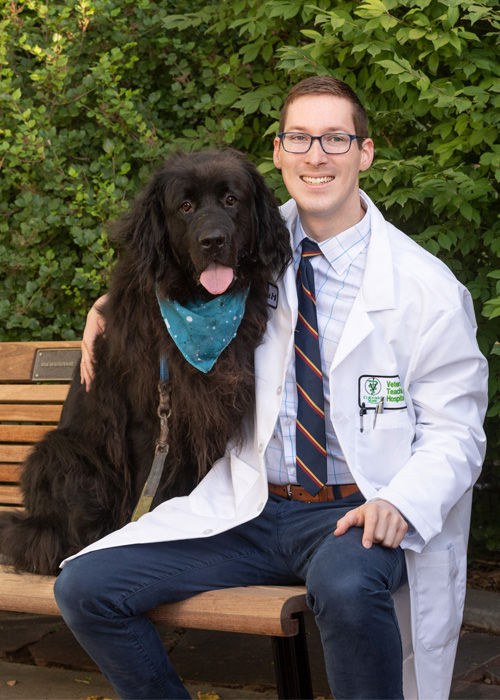
Dr. Beck Ringdahl-Mayland, D.V.M.
Medical Oncology Resident
Elliott’s Long Paw Scholar
I was born and raised in Minneapolis, Minnesota, and discovered a love of animals at a young age. The daycare that I attended had a dog, and to me that was the most exciting thing in the entire world. They even let me feed the dog on occasion, which I thought made me the coolest kid alive. From that point on I spent a large portion of my time reading books about dogs and telling my parents how much we needed a dog. I got my wish when I was about six years old, and my family adopted a beautiful Newfoundland named Mara. Shortly after that, I learned about veterinarians and quickly decided what I wanted to do with my life.
Throughout middle school and high school, I volunteered at the zoo and shadowed in veterinary clinics to get more experience. Along the way, my family adopted a retired Newfoundland named Casey from a breeder – further solidifying my love and appreciation for gentle, big, furry dogs with a penchant for leaving slobber in unreachable places. By the time I left for Grinnell College in Iowa, I knew that I wanted to major in biology, apply for veterinary school, and adopt a dog.
I didn’t end up adopting a dog, but I did major in biology at Grinnell College. I also developed an interest in research after working on a project studying genes involved in the formation of biofilms by bacteria. I enjoyed this experience so much that I delayed applying to veterinary school so that I could spend an additional year working in a lab. I even considered pursuing a Ph.D. in microbiology instead of applying to veterinary school. While I enjoyed basic research, eventually the pull to veterinary medicine was too strong to resist.
I attended veterinary school at the University of Minnesota and worked as an after-hours/on-call technician in the clinical pathology lab. I also adopted a Newfoundland named Louie. During my time in the clinical pathology lab, I found that the emphasis on diagnostic tests complemented my interests in basic research and veterinary medicine, and I strongly considered a career as a clinical pathologist. I maintained an affinity for clinical pathology (and still do) until my fourth-year clinical rotations when I learned that I genuinely enjoyed patient care, educating owners, and helping families work through their options.
Once again, I had to consider what I wanted to do, and more specifically how I wanted to use my veterinary degree to improve the wellbeing of pets. In thinking about my options, I reflected on my own experiences with pet cancer. When I was in middle school, my family’s first dog, Mara, was diagnosed with osteosarcoma. At the time, I knew very little about her treatment options, but I appreciated the sense of calmness and sincerity that the veterinarian provided in helping us work through the diagnosis.
My family’s second dog, Casey, was diagnosed with hepatocellular carcinoma the summer before my senior year of college. I encouraged my family to bring her to veterinarians at the University of Minnesota. It was my first experience in a large veterinary teaching hospital. I was amazed by the level of care, the availability of advanced imaging, and the ability to quickly diagnose the disease.
My early personal history with pet cancer influenced my interest in veterinary medicine, and as I progressed in my studies, was ultimately instrumental in drawing me to specialty medicine.
After graduating from veterinary school, I moved to Raleigh, North Carolina, and completed a one-year rotating internship at the North Carolina State University Veterinary Teaching Hospital. At NC State, I had the opportunity to improve my clinical acumen, teaching skills, as well as help families work through a dizzying number of diagnostics and differentials – all of which I believe helped me in my day to day work at the Flint Animal Cancer Center. The experience also further solidified my interest in the field of oncology, and I found that I felt most fulfilled when I was able to provide families with comprehensive information. This realization is what ultimately led me to decide that I wanted to continue my education at the FACC.